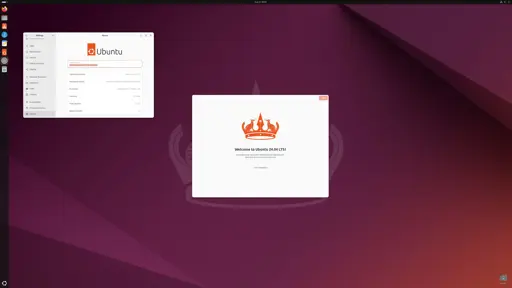- 342 Posts
- 188 Comments

 12·11 个月前
12·11 个月前The reason why
string[5] = '5'doesn’t work is that strings in Python are immutable (cannot be changed). By doinglist(string)you are actually creating a new list with the contents of the string and then modifying the list.I wonder if ChatGPT explains this or just tells you to do this… as this works but can be quite inefficient.
To me this highlights the danger with using AI… sure you can complete a task, but you may not understand why or learn important concepts.
Path objects also override the / operator to join paths
This is both cool and gross… gives me C++ vibes (operator overloading abuse).
Over the course of the last 20 years, I’ve gone from Arch -> Void -> Pop!_OS -> Ubuntu, and that is what I use on all my machines (laptops, desktops, servers).

 3·11 个月前
3·11 个月前According to #243 Chatting COSMIC Desktop Alpha With The CEO | Carl Richell, they are planning an alpha release on the last thursday of each month. This means that Alpha 3 should be out on October 31, 2024.
Likewise, Carl hopes to have a Beta 1 in January 2025.
Old School Runescape.

 23·1 年前
23·1 年前This one hurts… as I use this as my password manager on mobile :{

 168·1 年前
168·1 年前I think the “Ubuntu Core 22” means it is the snap based version of Steam rather than the deb version.
If you look at the snapcraft.yaml for the Steam snap, it uses
core22as its base.

 101·1 年前
101·1 年前Looks like a number of patches are landing in Ubuntu to address this: https://bugs.launchpad.net/ubuntu/+source/cups/+bug/2082335
Update: CUPS Remote Code Execution Vulnerability Fix Available

 68·1 年前
68·1 年前This is a great summary. Thanks!

 19·1 年前
19·1 年前It looks like you are running XFCE instead of GNOME (the normal Ubuntu desktop). I’m not sure how that happened… but you an always just install another desktop.
For instance, you can try to make sure you have the
ubuntu-desktoporubuntu-desktop-minimalmetapackage installed:sudo apt install ubuntu-desktop-minimalAfter that, the login manager should allow you to select the Ubuntu session rather than the XFCE one.

 4·1 年前
4·1 年前Yes, based on the diagrams on their blog, it looks like this only impacts Snaps.

 12·1 年前
12·1 年前From the Discourse Blog:
The Linux desktop provides XDG Desktop Portals as a standardised way for applications to access resources that are outside of the sandbox. Applications that have been updated to use XDG Desktop Portals will continue to use them. Prompting is not intended to replace XDG Desktop Portals but to complement them by providing the desktop an alternative way to ask the user for permission. Either when an application has not been updated to use XDG Desktop Portals, or when it makes access requests not covered by XDG Desktop Portals.
Since prompting works at the syscall level, it does not require an application’s awareness or cooperation to work and extends the set of applications that can be run inside of a sandbox, allowing for a safer desktop. It is designed to enable desktop applications to take full advantage of snap packaging that might otherwise require classic confinement.
So this looks like it complements and not replaces the XDG Desktop Portals, especially for applications that have not implemented the Portals. It allows you to still run those applications in confinement while providing some more granular access controls.
From what I can tell, Pop!_OS does not ship their own version of timeshift. Instead, it comes directly from Ubuntu. So if there is a change in maintainers, it should be reported to Ubuntu:

 4·1 年前
4·1 年前I used to use VLC for music, but these days I use Symphony to play local files on my phone. VLC tended to struggle when scanning or indexing large folders (which it did all the time…), while Symphony is a bit better at that. That said, I still use VLC for video and for casting things from my DLNA server (VLC supports Chromecast).
For ebooks, I’ve used Librera FD and that has been mostly OK. I’ll checkout the two you mentioned though. Thanks!

 3·1 年前
3·1 年前On Ubuntu, there is a program called “Firmware Updater” which uses LVFS to retrieve and install firmware updates (including BIOS/UEFI).
According to this page: https://fwupd.org/lvfs/devices/com.lenovo.ThinkPadN23ETXXW.firmware your Carbon X1 Gen 6 should be supported.

 6·1 年前
6·1 年前All my servers moved to 24.04 and I wanted my desktop to keep in line with them (so they all had the same packages). Likewise, I’ve been following the development of GNOME and I really liked what they have done with versions 45 and 46, so I wanted to try a more modern version of that desktop environment (Pop 22.04 is still on GNOME 42 and is now missing out on some cool features like the quick settings menu).
Finally, I wanted to try out Wayland and the experience on Pop 22.04 is not great with Wayland, especially since it is missing out on the more recent fixes and updates in Ubuntu 24.04.
If you are happy with Pop 22.04 and willing to wait for COSMIC to stabilize and become feature complete, then that is what you should do. For me, I used this delay in releasing Pop 24.04 as an opportunity to try out something different and for the most part, I’m pretty happy with the experience.

 12·1 年前
12·1 年前Unfortunately, there will not be a release of Pop 24.04 with GNOME before COSMIC is released. In fact, System76 has stopped development of Pop-shell as referenced here:
https://reddit.com/r/pop_os/comments/1eo59wj/will_xorg_still_be_an_option_in_2404/
Once, Pop 24.04 is released, you will be able to install gnome-session to get GNOME, but it will be the version from Ubuntu and not Pop-shell (though you can install the unsupported extension yourself).
Basically, the development of COSMIC is delaying the release of Pop 24.04… which means the whole distro update probably won’t come until 2025 as the desktop matures.
For this reason, among others, I’ve decided to switch to Ubuntu until COSMIC matures and Pop 24.04 is released.

 18·1 年前
18·1 年前I think you meant Pop!_OS (is developed by System76). TuxedoOS is developed by Tuxedo Computers, which is a European Linux focused hardware company.
That said, the point stands… there are hardware companies making Linux supported devices.















It was, but it looks there are some fixes: https://security-tracker.debian.org/tracker/CVE-2024-48990